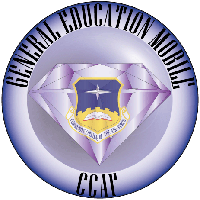Community College of the Air Force (CCAF) General Education Mobile (GEM) Program
Southwestern College Professional Studies is a General Education Mobile (GEM) provider that offers general education curricula that meet CCAF degree requirements. The GEM program is an initiative by the Air Force and Space Force to assist Airmen and Guardians in obtaining their CCAF faster and with more continuity. The GEM program is a block of online classes that are needed for an Airman or Guardian to obtain his/her CCAF. Southwestern College Professional Studies offers classes in each of the blocks of general education categories needed to complete the CCAF.

GEM Approved Courses
(All classes are 3 credits unless otherwise noted)
Oral and Written Communication Courses
COM 125: Speech
This course helps learners majoring in any discipline strengthen communication skills essential for success in academics and the workplace. Learners will focus on listening, evaluating, and delivering spoken discourse based on audience and purpose. Learners will evaluate why some people are more effective than others as public speakers, analyze speeches and audiences, study ethical considerations for speakers, research and organize findings on a topic, and present findings before an audience, and learn techniques for identifying and reducing speech anxiety.
ENGL101: Composition 1
This course helps learners develop writing skills that are transferrable to any academic or workplace writing task. The course guides learners through the process of planning, drafting, revising, editing, and proofreading academic and workplace writing. Learners will develop skills necessary to craft coherent sentences and paragraphs, to edit editing their writing for proper spelling, grammar, and punctuation. They will learn about narrative structure and techniques as well as the elements of successful argumentation and persuasive discourse. This course also guides learners through every stage of the research process. Learners will develop a research plan, conduct research, organize and draft a research paper, and then revise, edit, and proofread that research paper.
ENGL102: Composition 2
This course builds on the thinking and writing skills introduced in Composition 1. Learners will write critical, argumentative essays based on their interpretations of nonfictional texts, including literary, film, and cultural texts, and in doing so, will recognize the role of rhetoric in the writing situation as they craft persuasive discourse. In doing so, they will learn methods of questioning, analyzing, and evaluating their own beliefs as well as the perceptions and perspectives of others. These methods of critical thinking are intended to improve the quality and organization of learners’ writing for any purpose, including academic and workplace purposes. In addition to writing essays, learners will develop more advanced research strategies, as well greater proficiency in APA style.
Prerequisite: ENGL101
Mathematics Courses
MASC105: Intermediate Algebra
This course focuses on basic algebra skills, such as simplifying expressions and solving equations using variables for unknowns. Once learners are able to solve problems using basic algebra, they will apply this knowledge to business, consumer, and science contexts. Learners will develop skills necessary to solve real-world problems using more sophisticated mathematical tools. This course is designed to prepare learners for more advanced courses in algebra, as well as business and science courses requiring the application of algebraic principles.
MASC110: Statistics & Probability
This course acquaints learners with the tools and major components of statistics. Learners will apply technology to analyze data. The course also includes the foundational terminology and practices used in contemporary statistics, such as data collection, metrics, score interpretation, and experimental design. Additionally, this course will promote the skills that learners need to be able to take information from the world around them and use it to make sound decisions based on solid evidence.
MASC115: College Algebra
This course provides learners with the algebra, reasoning, and problem-solving skills needed for everyday life. The course focuses on simplifying expressions and solving equations in real-world situations using variables for unknowns. Learners will solve problems using algebraic principles and tools and then incorporate these mathematical concepts into realistic business, consumer, science, and statistical contexts.
Social Science Courses
SOC131: Sociology
This course will not only explore the major perspectives, principles, theories, and methods that govern the study of people and social structures, but it will also help learners identify ways that sociology can improve their lives and the lives of those around them. Learners will trace sociology’s historical roots, scientific basis, and major perspectives, as well as how sociology is changing due to rapid globalization and modern technological advances. Learners will also identify and apply contemporary and historical theories of how people relate, engage in conflict, and form larger structures, such as institutions, societies, and punishment systems; explore how populations shift and how groups form, act, grow, and shrink; and learn about the roles of culture, gender, sexuality, age, class, and other factors that make a person an individual and part of a larger group. Learners will then apply their understanding of these factors to one’s role in larger society.
PSY110: General Psychology
This course explores major perspectives, principles, theories, and methods that govern the study of mental processes and behaviors. Learners will trace psychology’s historical roots, scientific basis, and major perspectives and consider contemporary and historical theories of how biological, cognitive, and environmental factors underlie and influence human development, sensation and perception, consciousness, intelligence, and social dynamics. Learners will also examine the theories and processes essential to learning, memory, motivation, and personality, identify psychological disorders and their treatments, and discuss application of psychological principles to everyday experiences and real-life examples.
PSY252: Developmental Psychology
Learners in this course will gain a basic understanding of the biosocial, cognitive, and psychosocial development in humans from birth through adolescence, with additional emphasis on young adult through death.
Prerequisite: PSY 110.
PSY262: Social Psychology
The course explores the social factors in behavior of individuals and groups, including attitudes, leadership, personality, and culture.
Prerequisite: PSY 110. Credit 3 hours.
SSC110: Principles of Microeconomics
Principles of Economics II Micro EXP provides learners with an introduction to fundamental economic concepts and to how these concepts play out in the real world. Learners will apply essential models of economics to concepts such as economic interdependence and market equilibrium and think about how these models contribute to optimal resource allocation. Learners will address classic microeconomic issues such as profit maximization and determining the optimal output. Learners will also discover how decisions are made within companies in different market structures and how the industry within which a company operates affects its competitive efficiency.
SSC111: Principles of Macroeconomics
This course introduces learners to fundamental economic concepts and encourages them to consider how those concepts apply to the real world and to their own lives. Learners will explore the models of economics, how they portray economic interdependence and market equilibrium, and how they contribute to optimal resource allocation. Learners will examine classic macroeconomic issues, such as the effects of government intervention on businesses and individuals. They will evaluate macroeconomic conditions, think about how monetary and fiscal policies affect the corporate world and the overall economy, distinguish between short‐ and long‐run macroeconomic forces and learn how monetary systems influence economic variables.
SSC133: Geography
This course explores the major themes in geography-human and environment in interaction, patterns of distribution of natural phenomena affecting human use of the earth, and the cultural patterns of occupancy and exploitation of the natural world.
HIS120: World History
This course guides learners through the roughly 150,000 years of recorded human history, highlighting the eras that were most influential in shaping our current historical context. Learners will use both primary and secondary sources to trace the development of modern nations, cultures, and institutions, and explore the interactions of key world cultures through various lenses: religious, political, social, and economic. In the process, learners will construct an accurate and nuanced understanding of how history is constructed and the role it plays in shaping the present. Learners will also examine the relationship between ideas learned in the course and the events in their own lives and use historical analysis skills to analyze historical events and apply what they learn to an examination of current problems.
Humanities Courses
HUM201: Ethics
Ethics introduces learners to moral philosophy, the branch of philosophy that questions what is good and bad. The course surveys a number of important ethical theories—ethical relativism, objectivism, egoism, altruism, utilitarianism, duty-based moral theory, natural law, natural rights, and virtue ethics—as they examine reasons why certain actions are morally right or wrong. Learners will apply ethical theories in the evaluation and analysis of current controversial issues, question ethical matters from a variety of angles, and acquire new tools to assist them in making ethically sound, well-informed decisions throughout their lives. This course is writing intensive. Prior completion of ENGL102 is highly recommended. Credit 3 hours.
ARTS110: Theatre Appreciation
The purpose of Theatre Appreciation is to increase learners’ understanding, appreciation, and critical perceptions of the theatre. Readings and discussions will focus on the elements of theatrical practice; artists and innovators of theatre throughout history; and on the theatre’s development as an art form and a social phenomenon; participation in class forum discussions and sharing of critiques and short reports will offer avenues to explore learners’ individual theatrical interests; and optional attendance at theatrical events will offer firsthand experience in theatre arts.
ARTS124: Art Appreciation
This course is designed to develop a personal appreciation of art. By combining a study of concepts and artist’s work, students will increase their knowledge and ability to understand art critically.
LAN124: Elementary Spanish
A language course with an emphasis on understanding, speaking, reading and writing phrases of practical value. No previous Spanish courses are necessary.
THEO225: Christian Ministry in Pluralist Context
Exploration of religion and its role in human life, coupled with a study of the origin and development of significant concepts that have influenced modern man’s ideological heritage.
Helpful Links
Application for Enrollment
Tuition and Fees Schedule
Tech Support
The Southwestern College GEM Point of Contact is:
Brenda Hicks
Interim Coordinator of Military Education
Phone: 620.229.6215
Toll Free: 888.846.1543 ext. 6215
Email: va@sckans.edu


